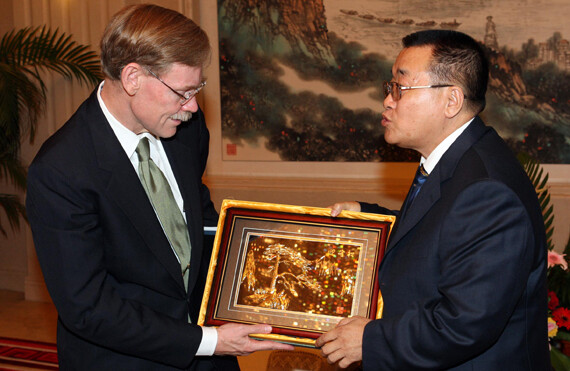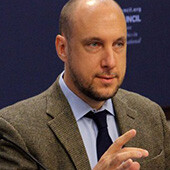During the height of the crackdown in Burma this fall, a U.S. official admonished China for its support of the military junta: "You wanted to become a big power—part of being a big power is you will be held responsible for your client states" (Washington Post, September 29, 2007). Demarches like this are part of the Bush Administration's strategy of encouraging China to become a "responsible stakeholder" in the international system. Recent Chinese refusals to grant port calls to American naval vessels in Hong Kong cast doubt on whether China has risen to the challenge.
Two years ago, then Deputy Secretary of State Robert Zoellick told the National Committee on U.S.-China Relations, "It is time to take our policy beyond opening doors to China's membership into the international system: We need to urge China to become a responsible stakeholder in that system." This much-celebrated comment reflects the predominant view among U.S. policy elites that by giving China a stake in the international system the United States can manage its rise.
But questions surrounding America's credibility undermine the stakeholder approach. For instance, claims like those made by Zoellick in May 2007, that suggest the United States "could help China rebuild its health care system, improve the environment, and develop a pension system," are dubious. The irony is not lost on Beijing when a country with 47 million uninsured citizens, among the highest per capita carbon emissions, and one in ten elderly living in poverty offers help on these issues. The point is not that the United States cannot help—thousands of Chinese doctors have been trained in U.S. medical schools, for instance—rather it is the tone and public nature of Washington's statements that undermines the credibility and effectiveness of the policy.
Even after translating responsible stakeholder various ways, some Chinese remain uneasy with its connotations. Their concerns fall into two groups. The first believes it is a Trojan horse—an initial acknowledgment of China's rise that could mask efforts to lock in Beijing's position vis-à-vis Washington in the international system. Even if U.S. intentions are benign, some Chinese believe America's desire to preserve itself as the global hegemon underpins the stakeholder concept.
Second, some Chinese critics perceive the phrase as condescending. The term, they argue, implies that China would be an irresponsible power if it does not perpetuate the U.S.-led international system.
Yang Wenchang, president of the People's Institute of Foreign Affairs, contends that while the administration's responsible stakeholder concept acknowledges China's achievements over the past 30 years, it "implies doubts about whether China will fulfill the international responsibilities they think China should undertake." Yang thinks Washington seeks to "guide China in exercising its responsibilities" and concludes that such doubts are "unfair" in light of China's already significant contributions.
Conversely, Beijing officials who describe China as a nation coping with a variety of serious internal problems, feel the phrase is intended to embarrass. China's food scandals, environmental degradation, and low labor standards have led many Chinese to question whether their country is ready to be an international stakeholder on such issues. This suggests that Beijing will remain a selective stakeholder and continue its à la carte engagement based on Communist Party interests.
Beijing already holds some important stakes, particularly on issues close to home. China hosted the six-party Korean nuclear talks, has become East Asia's economic powerhouse, and helped create the East Asian Summit framework, which held its annual meeting in Singapore last month culminating in an agreement on climate change. In spite of these arguable successes, however, skepticism in Beijing suggests that the influence of responsible stakeholder theory among Chinese policymakers may diminish over time.
On economic stakes, including intellectual property rights and currency valuation; social stakes, such as human rights and internet freedom; and security stakes, including Burma and Iran, China moves at its own pace. That pace, however, is too slow for a growing number of critics who see troubling trends and are soon likely to rethink the Bush Administration's responsible stakeholder approach to China.
Eisenman is fellow in Asian Studies at the American Foreign Policy Council. He is pursuing a Ph.D. in political science at the University of California, Los Angeles. Stewart is program director at the Carnegie Council for Ethics in International Affairs in New York.
This article is licensed under a Creative Commons License.
Please read our usage policy.





